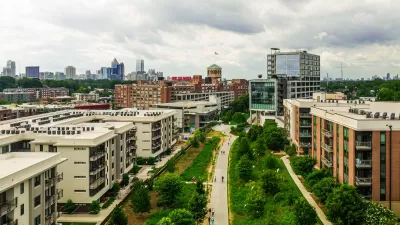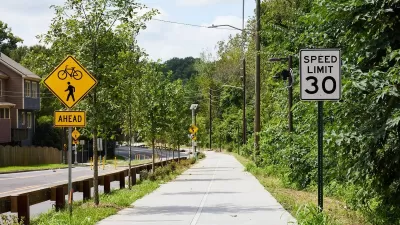Much to the chagrin of those who partake in the city's congested commute, cars dominate as Atlantans' prime means of mobility. The city's wildly ambitious BeltLine project seeks to change this, but can it be built fast enough to have an impact?
"Seven years into the wildly ambitious Atlanta Beltline, a 25-year, $3 billion project, more than 640 acres of land have been acquired and tens of millions raised," writes Jared Green. "By the end of the project, more than 22 miles of modern streetcars, 1,300 acres of new parkland, and 33 miles of bike and pedestrian trails will make Atlanta a far more sustainable, livable, and inclusive place."
But to date, only 60 of those 1,300 acres have been built, and the project has faced numerous financing obstacles along the way. Green tours the project as part of the E.P.A.’s Brownfield conference, and reports on the many promising elements that, when implemented, are envisioned as "the tipping point that will get Atlantans out of all those cars."
Though some spectacular projects have been completed, and the designs for many more are progressing, one wonders if they can gain enough momentum to bypass the city's embedded car culture.
UPDATE: The article has been revised to indicate that 60, rather than 27 acres of new parkland have been built by Atlanta Beltline Inc.
FULL STORY: With the Beltline, Atlanta Wants to Become a New City

Maui's Vacation Rental Debate Turns Ugly
Verbal attacks, misinformation campaigns and fistfights plague a high-stakes debate to convert thousands of vacation rentals into long-term housing.

Planetizen Federal Action Tracker
A weekly monitor of how Trump’s orders and actions are impacting planners and planning in America.

In Urban Planning, AI Prompting Could be the New Design Thinking
Creativity has long been key to great urban design. What if we see AI as our new creative partner?

Florida Seniors Face Rising Homelessness Risk
High housing costs are pushing more seniors, many of them on a fixed income, into homelessness.

Massachusetts Budget Helps Close MBTA Budget Gap
The budget signed by Gov. Maura Healey includes $470 million in MBTA funding for the next fiscal year.

Milwaukee Launches Vision Zero Plan
Seven years after the city signed its Complete Streets Policy, the city is doubling down on its efforts to eliminate traffic deaths.
Urban Design for Planners 1: Software Tools
This six-course series explores essential urban design concepts using open source software and equips planners with the tools they need to participate fully in the urban design process.
Planning for Universal Design
Learn the tools for implementing Universal Design in planning regulations.
Gallatin County Department of Planning & Community Development
Heyer Gruel & Associates PA
JM Goldson LLC
City of Camden Redevelopment Agency
City of Astoria
Transportation Research & Education Center (TREC) at Portland State University
Jefferson Parish Government
Camden Redevelopment Agency
City of Claremont





























